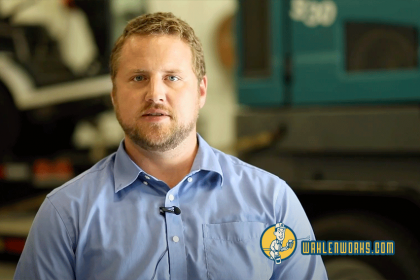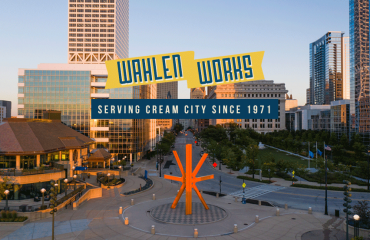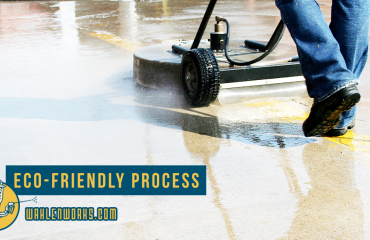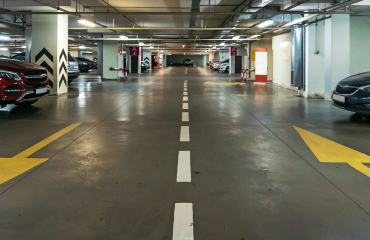
Jim Wahlen is well-known in the Milwaukee area as an expert in the care and maintenance of concrete structures and exteriors. He is leading the company his grandfather founded in 1971, building a hard-working team, and staying at the forefront of technology.
While he was born into the business, he doesn’t take it for granted. After working on the front lines of Wahlen Works in high school and college, he spent eight years in the corporate world. It was enough time for him to gain valuable business experience, and also to realize he wanted to take on the challenges, and experience the satisfactions, of running the family business.
We spent a few minutes talking with Jim about facility maintenance, excellence on the job, and growing the family business.
Tell us a little bit about your background in the corporate world. Where did you work and what did you do?
I studied commercial recreation and tourism in college. After graduation, I worked at the Great Wolf Lodge in the Wisconsin Dells for several years, then went to work for Wyndham Worldwide as a financial auditor. It was during this time that I came to realize the importance of personal relationships and the critical role of small, family-owned businesses to our communities.
You’ve been a part of the family business for more than 12 years now. What are your day-to-day responsibilities and how has that changed over the years?
At first I was very much in the business, on the front lines, doing the work. Over time, I took on more of the management and leadership responsibilities, where I have focused on recruiting talent and building our team. More recently, I’ve been looking for ways to grow and expand the business, developing a streamlined management system, and looking to the future.
What are you most proud of?
I’m most proud of the culture we’ve created here. We have a tight knit group of people that work well together. They are focused on the task at hand and ensure that we produce a very high quality of work on a consistent basis.
You are experts in maintaining concrete. What are two or three things you wish people knew about concrete that they don’t?
First, that concrete is very long lasting if you take care of it. Most people think that concrete requires little or no maintenance, but that’s not the case in our climate. People don’t realize that concrete is porous. It’s like a sponge with voids that liquids, such as water and chemicals, can penetrate. Once water has penetrated the concrete, Wisconsin’s freeze-thaw cycle begins to work on it, degrading it rather quickly. Preventative maintenance slows this process and in some cases, can eliminate it almost entirely.
Second, all concrete isn’t the same. Some of it is poured above grade, some is poured below grade, and some is installed in panels. Each of these require different methods of cleaning and maintenance. For example, many newer parking structures have been built with concrete panels and they can move around a little bit by design. The caulking between the panels needs to be maintained differently than the concrete. Also, traffic patterns need to be taken into account when you’re working on the upper levels so that people on the lower levels are protected while you’re doing your job.
What are some of your favorite success stories?
We often encounter epoxy in structures. It discolors pretty quickly with traffic. Heat and friction from the car tires makes it worse where cars turn in the structure because they all turn in exactly the same place. With our knowledge of chemicals and cleaning solutions, we know what it takes to clean it without damaging the surface. We’re able to get it a lot cleaner than our competitors, which makes our customers very happy.
Do you have any cautionary tales to tell?
Sometimes when historic buildings are renovated and turned into residences, there are unwelcome surprises. In one case that we know of, drainage issues weren’t taken into account when storage units were installed in the garage area. They were flooded and ruined the resident’s property. That could have been avoided if we had been called in for a pre-renovation consultation.
In another, there was a parking structure where the maintenance company didn’t know how to remove stains properly and didn’t do wastewater recovery. By the time we were called and fixed the problems, it ended up costing the company more than if it had been done correctly in the first place.
What are some things you do differently from your competitors that may fly a little bit under the radar but have a big impact on the results customers see?
It starts with our quoting process. We want to see the facility in person, analyze the project, and develop a scope of work. We know to ask the questions most people wouldn’t think to ask; for example, how do you plan to vacate an entire garage at once in a downtown area with limited street parking. We work with our customers to prepare for that ahead of time. Because we work with so many people, we often know someone who can accommodate them for the day while we get the job done.
We also invest in state-of-the-art equipment, with replacements ready to go as back-up if necessary. This way there are no delays due to equipment failure which greatly reduces the risk of having to cancel and reschedule service.
What are your predictions for the future of your industry?
Pressure washing and related cleaning is going to become more and more environmentally conscious. Wastewater recovery requirements will increase. Knowing which chemicals to use in order to maintain a green clean standard will become critical.
When it comes to pavement marking, keeping abreast of the changes in symbols is very important. For example, the handicapped parking symbol is being redesigned to increase visibility and be more sensitive to the feelings of people in wheelchairs.
Regarding materials, longer lasting paints are being developed all the time. It’s important to stay on top of those changes and the latest technologies.
How do you envision the growth of Wahlen Works growing over the next several years?
We will definitely be staying on top of the technology and upgrading our materials and processes in line with that.
Our culture allows us to do things more efficiently to keep costs under control, which gives our customers better service at a better price. We spend, and will continue to spend, a lot of resources on training programs so best practices are being used. We offer employees continuing education so they are all trained on the latest methods.
We are a place that people want to work and we want to continue to be that. We want their experience with us to enhance their life, not just be a place to go for a paycheck.
We also want our work to enhance the lives of our customers and will continue to strive for that.



